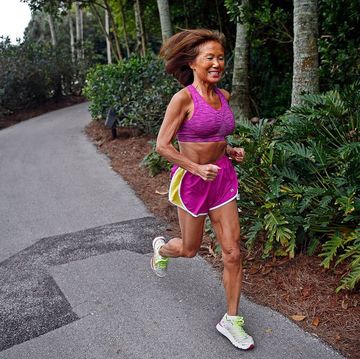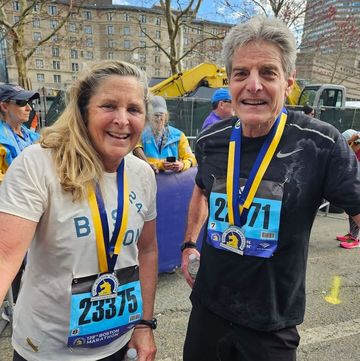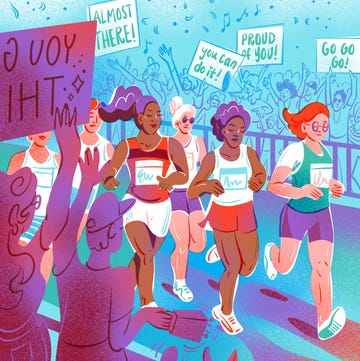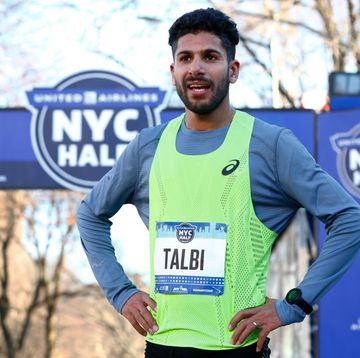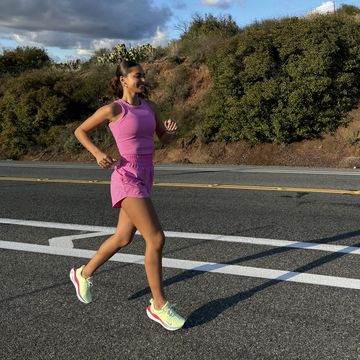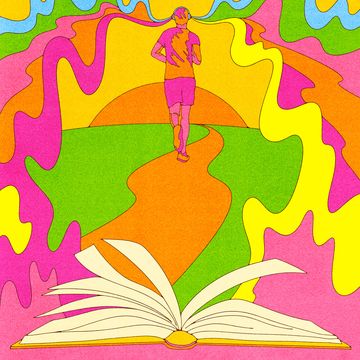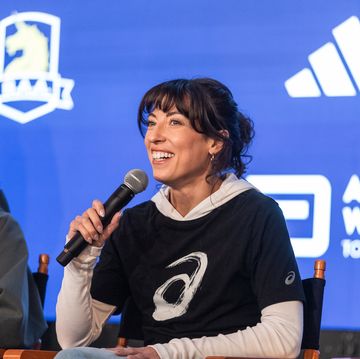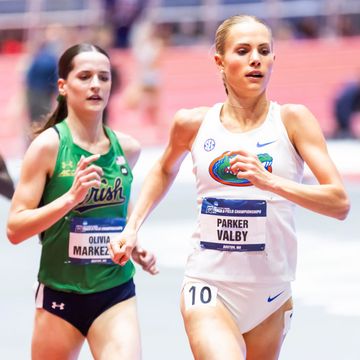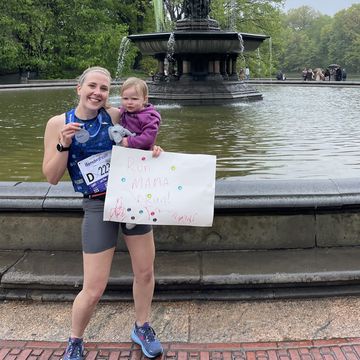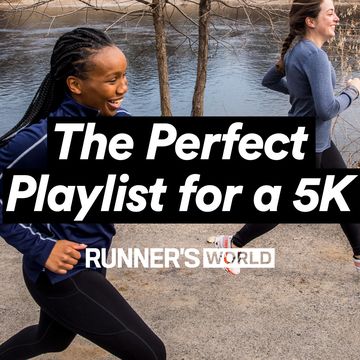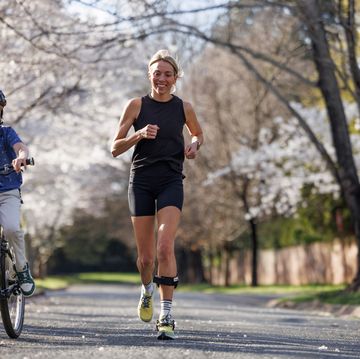Can you tell me about your first Boston Marathon?
Yeah, I thought I'd never run it again. [Laughs.] I ran Boston with my charity [Tedy’s Team] for the first time in 2012. My goal was 4:30, but the heat that day slowed me to a 5:26. At 3 a.m. that night I had to go to the hospital to get IVs. I was like, Holy smokes, how could anyone do this! I know the weather was part of the reason. But there's a reason less than one percent of the population has finished a marathon.
Where were you during the 2013 marathon?
Last year I was hanging out the window of the Lenox Hotel, watching the race, when I saw the first blast, then felt the second one behind me. My team’s headquarters was on the second floor, right in between both blasts. We had some runners that had already finished, and many families—my family was there, my wife and three sons—and the families of runners that had not finished yet were there. So you can imagine the fear of not only not knowing what was going on, but also Where is my loved one running this race? And not having any comprehension of what or why anything like this would happen.
What were those moments like immediately following the blasts?
Phones went down very quickly. In all, I had 36 runners stopped at mile 25. I was trying to keep their families calm and account for them via email. The number one concern for everyone was, "Where are they?" A lot of those answers didn't come quickly. The next thing we know, we're getting kicked out of the Lenox Hotel. Then everyone becomes mobile, and then you're trying to find out the information as we walked the streets away from the hotel. It was a very emotionally trying day.
Once you found out what happened, what was your reaction?
I think I went through the emotions that everyone went through. You wonder why someone would do that. You pray for everyone that got hurt. With all of that, you feel anger. To me, 4:09 is where the real winners finish, people running for charities. For the bombers to do it then spurs my anger. I mean, the elites are done. The guys that win, that get money, that get their name in the paper, are done. All these other people doing it for the American Stroke Association, or Dana-Farber, or any organization that they feel compelled to run for, for them to do it then... You want them found, you want it solved, and you want to give everyone a sense of determination, that we still will be okay, and we will overcome this.
When did you decide that you would run the 2014 marathon?
A month later, I told my runners that in 2014 I’d run and we’d all finish together. We were having a post-marathon party for our runners. I know that they'll be reliving all of it on Marathon Monday. And instead of performing the spokesman/support role, I want to go out there and be there for them and the rest of the city.
Why did you form a running group in the first place? Why not something related to football?
I had a stroke in 2005. That year I launched Tedy’s Team to help other survivors meet, talk, and train together for this city’s signature event.
I wanted it to be attached to New England. This is an area that I love. I love living here. And playing football for the Patriots for 13 years, I learned that nothing says New England like the Boston Marathon. My first team was very, very small. I think it was single digits, but their first race was the 2006 Boston Marathon. Tedy's Team is something that has helped a lot of people not only raise funds for research and awareness, but also gives them a chance to talk about it. It was hard for me at first to say, Yeah, I had a stroke. It's a part of my life, it's a part of my history—it's hard to go out there and say those words.
Was distance running part of your regimen during your NFL career?
The longest I had ever run before training for the 2011 Falmouth Road Race was about a mile, a mile and a half. [Laughs.] I had never—I was all about explosive training, explosive lifting, burst, that type of stuff. Falmouth was my first race. [He finished in 1:12.]
2008 was my last season in the NFL. The Tedy’s Team marathon training regimen always began during football season, in October or November, and I couldn't even attempt to participate. Once I retired the seed was planted in my mind, and then a couple years ago, my wife and I just decided to take the leap. I've seen stroke survivors do it on my team. I've seen so many different people from so many different walks of life from my team have success. So my team inspired me to run.
Studies have suggested that running might help lower stroke risk. Did that factor into the formation of this team—and your decision to take up running after retiring from football?
Absolutely. One of the top ways to fight stroke—in addition to knowing the warning signs—is to keep yourself in the best physical shape you can. The doctors told me that one of the reasons why I was able to overcome and recover from my stroke was that I was probably in the best shape of my life. I was 31 years old, a professional athlete.
How big is the team that you'll have for the 2014 marathon, and how is training going?
We have 75 this year. We’ll work up to 30-mile weeks and do our long runs on the course. The longest run in March will be 21 miles. But, Nick, I go day by day, just like we did when I was with the Patriots. There's no stopping now.
Looking back on that 2012 race, is it possible to compare the pain you felt that day running in the heat to the pain felt during an NFL game?
Throughout the entire race—every runner would know this—you might be at mile 2 and start to have your back tighten up a little bit. You might be at mile 6 and then you start to have a little pain in your foot. You start to go up a hill and your legs start burning. A football lesson that helped me in the marathon: You will feel pain, but are you hurt, or are you injured? I know, as a football player, that when you continue to run, continue to push yourself, sometimes you push right through those pains and they disappear.
How do the Boston Marathon crowds compare to those in an NFL stadium?
Boston is the Super Bowl of road races. It’s like a 26.2-mile stadium. In 2012, I had headphones but took them out. I realized after mile one or two that, man, you want to hear that crowd. They give you a huge push throughout the entire race. I remember a kid threw me a football. I caught it and I threw it back to him. Thank goodness it was early in the race, because I might've fallen down trying to catch it after mile 21 or so. [Laughs.]
How has running changed your life?
Before I decided to take up the Boston Marathon, I didn't understand the concept of running. I didn't understand the concept of running long distances. Why would somebody want to do that?
I have the ability and confidence now to say, I'm going to go out and get a quick three miles in. I never imagined that statement coming out of my mouth before. I've learned that running can be addicting. I’ve felt that runner’s high. My brain tingles from the back of my head to my forehead. Almost like the rush I’d get from football, but different. You’re like, Wow, that’s what they’re talking about. There are certain miles it comes at, and it’s just that extra push you need.
Another former NFL player, Alan Faneca, recently ran the New Orleans marathon in 3:56. Did you see that? Does that motivate you?
I did see that he ran it. It excites me that my former colleagues have recognized running as a goal that they want to accomplish. Because a lot of people in the NFL—I remember, around the time of the Boston Marathon, I was on the treadmill with Tom Brady once, and he said, “We should run that race.” We see other great athletes and wonder if we could do it, too. That’s just who we are, mentality-wise.
Do you have a time goal for the 2014 Boston Marathon?
No, my goal is to finish. I know the chances are probably good that I'll finish above the time that I had back in 2012 because the heat was oppressive. People were dropping like flies out there. But I'll be pushing myself if the weather permits.
Do you anticipate any anxiety beyond normal race day nerves going into this year’s Boston Marathon?
Oh, I'm not worried at all. I don't think Boston's worried at all. Shoot, because of the work our guys over at BPD put in, they got them guys! [Laughs.] I feel safe. I don't feel any type of apprehension because of what happened last year. My team is motivated to go out there and run. Will it be in the back of a lot of people's minds? I mean, it's the year after. People will be thinking about it, but they won't have fear in their hearts; they'll have determination, in my mind.

